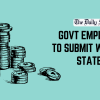A perplexing decision by Bangladesh Bank

The recent restrictions placed on journalists' access to the Bangladesh Bank (BB) have evoked understandable criticism from the journalist community as well as from Transparency International Bangladesh (TIB). It is quite a perplexing decision coming from a public institution which, by definition, is supposed to serve public interests. The media, too, is morally mandated to serve public interests. This it does by disclosing finance and banking related information, including any irregularities allegedly taking place in the sector. Access into Bangladesh Bank is thus crucial for any journalist covering the sector. We are, therefore, quite alarmed that the BB could take such a restrictive measure.
The central bank has reportedly instructed its security management and other departments not to allow journalists to enter its offices. The unprecedented restriction means that journalists covering the economy and finance will not be able to properly cover issues related to the economy. This is a disservice to the public but also to the government, which needs an honest appraisal of what is happening at the BB to make proper and timely interventions. Such reporting is all the more necessary at a time when the financial sector is facing severe challenges, including various irregularities, high inflation, and a dollar crisis that has affected many businesses and consumers.
Thus, journalists covering the economy and financial sector need full and unrestricted access to the Bangladesh Bank in order to get correct and verified information. Bangladesh Bank itself should also want to be accessible so that there is minimal risk of misinformation or rumours being circulated. All this makes its aforementioned decision rather difficult to understand.
The message emanating from such restrictions is not the kind that a democratic government would want to send to the people. It gives off the impression that this is being done to protect the interests of certain powerful quarters that have been playing a major role in the irregularities of the financial sector. We, therefore, urge Bangladesh Bank authorities to remove these restrictions so that journalists can have free access to the central bank as they did before. By exposing anomalies in the financial sector, journalists are upholding the people's right to know and helping the government by providing insights into this crucial sector so that problems are identified and solutions can be developed and applied. Surely this is a win-win system for all parties.

 For all latest news, follow The Daily Star's Google News channel.
For all latest news, follow The Daily Star's Google News channel. 









Comments